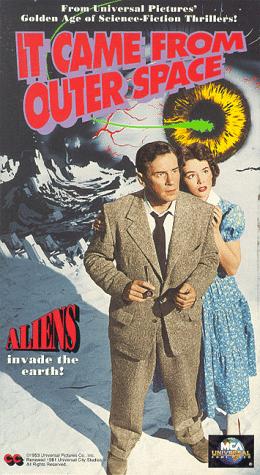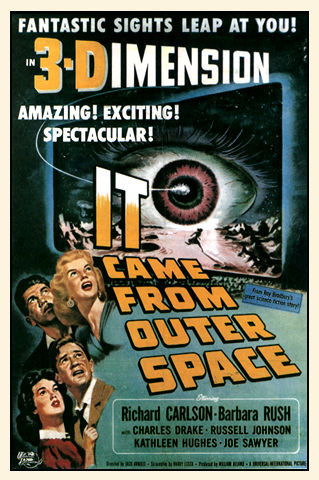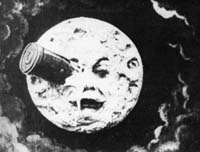
THE

 |
THE |
 |
[1] The “Man in the Moon” portion begins with the speaker asking the reader to go along with his storytelling—to suppose a hypothetical situation. What would we think if the inhabitants of the moon could possibly find a way to navigate their way to the planet earth? After all, man did not believe that he could sail across the sea, or through the air, but he did. After some incredible scientific advancement, those living on the moon could very well find their way to our planet. Examining a somewhat farfetched idea by using another farfetched idea that has materialized is a good strategy. It shows that the unimaginable could very well become reality. Now that Irving has the reader’s cooperation in this matter, he can go on to say what he wants to say. If these visitors claim to know so much more than we know, why shouldn’t we welcome them? If they are physically stronger, shouldn’t we comply with their demands? It all seems logical, sensible, and much like the relationship between the Europeans and the Indians. The newcomers find this planet populated by “savages” and resolve to take ownership of the land and subsequently its people.
[2] Irving describes a scenario that seems entirely ludicrous—one in which the head of the moon people, the “man in the moon,” issues commands and leads his followers on their little crusade to conquer their inferiors. The man in the moon is very much like the Pope. He serves a similar role and is very much the figurehead and spiritual leader that the Pope is. In an attempt to understand the tale, an example is highlighted, but at the same time, the subtle analogy is made. The man in the moon orders his people to conquer the new land. This is a detestable act. The man in the moon is comparable to the Pope. The Pope issued similar decrees regarding the New World. Draw your own conclusions.
[3] The inhabitants of the “dirty planet”
earth are we, that is, the white man. We are the “race of two legged
animals, that carry their heads on their shoulders instead of under their
arms” that the newcomers think are bizarre and abnormal. “They’re
weird looking with two eyes, not three,” the moon people would say.
“Where are their
tails?” Meanwhile, the “natives” are a bit confused. We are
white, not pea green—not like them. So what is so wrong with all
of this? Nothing. But wait—the Indians are not white, not like
us. So what is so wrong with that?
their
tails?” Meanwhile, the “natives” are a bit confused. We are
white, not pea green—not like them. So what is so wrong with all
of this? Nothing. But wait—the Indians are not white, not like
us. So what is so wrong with that?
[4] Our new neighbors want us to share our lives with many wives, not just one. They want us to give up Christianity and welcome a new religion. How dare they make such absurd demands? We have our own way of life and our own religion, and we have known no other. We do not need to know another. How dare they?
[5] But such are the goals of the “lunatics”—the ones who have come to show us the way, the right way to live, the only acceptable way. We should be glad, in fact, we should be grateful that they are so willing to enlighten us. Irving uses the word "lunatics" in referring to the visitors from the moon. It is interesting to note that the word also has an alternate meaning, one that is used more as an insult than as a descriptive word. This is an effective way to convey the notion that those who conquered the native inhabitants of America, just like the moon people who came to earth and took us over, are viewed simply as lunatics, as crazy and demented in both their mentality and their actions.
[6] For those who have the misfortune of being white, a taboo in this pea-green population, they should rightfully feel outraged. We are just like everyone else, they would argue. Skin color is no basis upon which to measure our value or worth. But if they finally look past the actual words of Irving and his imaginary beings from the moon, they would realize the satire and underlying sarcasm in every sentence of this piece. He places the dominant culture and population in the seat of the oppressed and persecuted and asks them to just suppose that they are in a different position. Perhaps if they themselves were the oppressed. If they were the ones ridiculed, tortured, and demeaned for nothing more than their skin color. If they were the ones whose lifestyles and forms of worship were labeled preposterous and therefore subject to conversion to a more civilized manner of living. The white man has managed to live in a particular geographic location for centuries, and then suddenly he is expected to not only give up what is rightfully his but to become slaves, play toys, and experimental objects to those who just arrived with peculiar looking weapons and a rather large superiority complex. What would the white man do? How would he feel? Would he willing bow to the new group? Would he undergo conversion quietly? Or would he be angry and refuse to be treated with such indignity and disrespect? Most likely the latter.
[7] Irving is not writing what he believes to be a commendable science fiction story. He is not suggesting that pea-green men from the moon are better then the white inhabitants of earth. He is merely utilizing satire as a tool with which to illustrate just how severely disillusioned and overly aggressive the Europeans had been. They came to an undisturbed country, with many unique societies, and exerted their will upon a group of people, inferior in their eyes because of differences, the most obvious being skin color. The “white man” would settle onto this land and call it his and make a life for himself and raise a family. His descendants are the American people who now enjoy what their ancestors forcibly took from the rightful inhabitants. Can these “Americans” feel good about their past? Can they be proud of their history—a history that began with the destruction and cheating of an unsuspecting people? Irving is hoping that they can see just how asinine and silly the logic of the moon invaders is and, in doing so, draw the parallels between this group and themselves and finally realize or even admit to the wrongdoing of their predecessors. No one in his or her right mind could misconstrue Irving’s intentions and in any way misinterpret such a story to be his actual beliefs. At least no one should.
